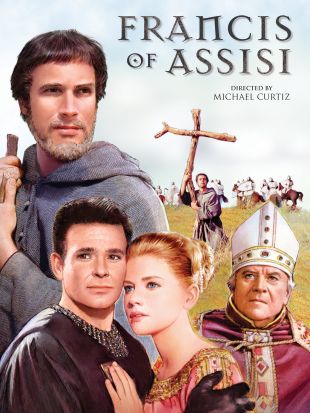
At the end of his long movie career, Michael Curtiz (1888-1962) directed this reverent biography of St. Francis of Assisi (1182-1226). Although the film cannot compare artistically with the masterpieces of Curtiz's heyday--such as The Adventures of Robin Hood, Casablanca, and Yankee Doodle Dandy--it is nonetheless a good film that paints a faithful portrait of Francis, born Giovanni di Petro di Bernadone but later renamed Francesco (Francis). Filmed on location, the production presents the story mainly in the medieval alleyways, churches, and dwellings of Assisi, an Italian hilltop town, and in the surrounding valleys and forests. The script follows Francis from his early adult years to his death, capturing most of the major events of his life, including his reported visions; his decision to forsake the emptiness of wealth for the fulness of poverty; his founding of the Franciscan religious order for men; and his visits with Pope Innocent III and a Saracen sultan. Bradford Dillman portrays Francis with straightforward sensitivity and piety, and Delores Hart ably plays his soul mate, Clare, a young woman so inspired by Francis that she founded her own religious order, the Poor Clares. Hart, an exquisitely pretty young woman who played Elvis Presley's love interest in two films, joined the Benedictine order of nuns shortly after making Francis of Assisi, eventually becoming a mother superior. A highlight of the film is the portrayal of the pope by the late Finlay Currie, the rotund, craggy-faced Scottish actor who was a mainstay of Hollywood epics, including Cleopatra, Ben-Hur, Solomon and Sheba, Ivanhoe, and Quo Vadis. Overall, Francis of Assisi contains much to commend it. Although it is not a great Michael Curtiz film, it is good enough to allow Curtiz to rest in peace, knowing that he made a final motion picture of merit.
